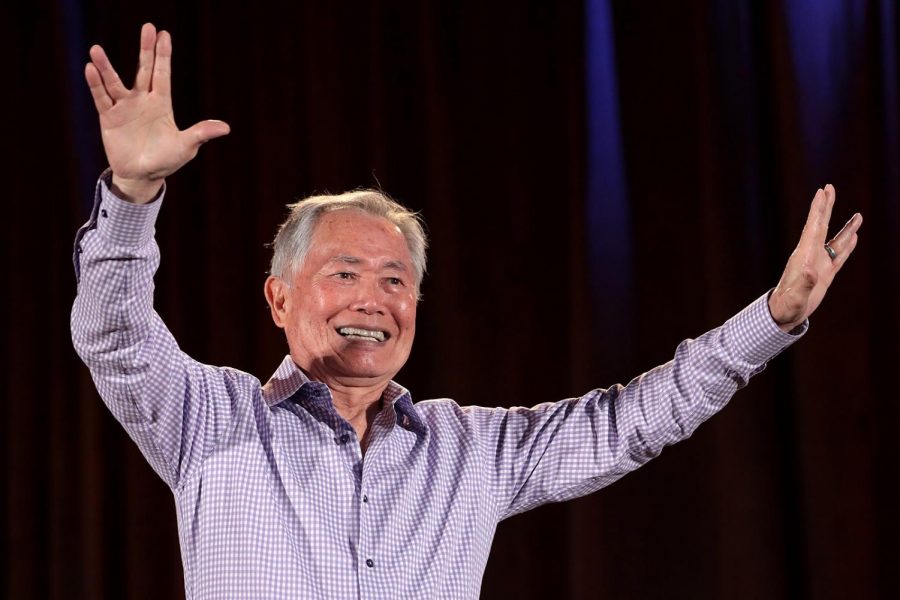Remembering Japanese internment camps through George Takei’s novel They Called Us Enemy
Photo by Gage Skidmore on Wikimedia Commons
Actor, author and Japanese internment survivor George Takei spoke at the “One Book One San Diego” event on Sept. 22.
September 26, 2020
Many people know George Takei from his work in the Star Trek franchise, but until recently, many were unaware of a monumental part of Takei’s childhood.
After Pearl Harbor, President Franklin D. Roosevelt signed Executive Order 9066, sending the National Guard to remove any Americans of Japanese descent from their homes and take them to concentration camps.
Among the 120,000 Japanese imprisoned in the United States was five-year-old George Takei and his family. Takei has recently written a graphic novel about living in internment entitled They Called Us Enemy.
Takei spoke at the “One Book One San Diego” event on Sept. 22 about his past experiences and adapting that into his novel.
They Called Us Enemy follows the true story of a young George Takei and his family being sent from Los Angeles to an internment camp in Arkansas and then a segregation camp in Northern California.
Takei said the segregation camp at Tule Lake, California was the “most notorious and cruel of all internment.”
The novel follows the family through the duration of the war, and also highlights some key historical events such as the loyalty questionnaire. This was a questionnaire that all imprisoned Japanese-Americans over 17 were required to take, pledging their allegiance to America and indicating that they would fight for the nation. When Takei’s parents refused to answer questions, they were sent to the segregation camp.
KPBS hosts “One Book One San Diego” annually and picks three novels to feature. This year, the selection committee chose to feature George Takei’s graphic novel They Called Us Enemy in two categories: teen/adult and Spanish-speaking. This is a first in the fourteen-year history of the event.
Due to the pandemic, the event for this year was moved to a virtual platform. A Facebook live video featured not only Takei’s words about his novel, but some aspects of local Japanese culture as well.
The event began with a performance by Genbu Daiko, who performs and teaches Taiko, a type of Japanese drumming. Next, San Diego City College professor Susan Hasegawa gave a brief overview of the history of Japanese-Americans in San Diego County, including the impact Executive Order 9066 had on Japanese-Americans in the region. Finally, Takei was interviewed by reporter Beth Accomando about his new graphic novel.
Takei says it has been his life goal to share his experiences of these events with all Americans.
“It’s been my life’s mission to raise the awareness of this sad and dark chapter in American history,” said Takei, which is why he wrote They Called Us Enemy in collaboration with artist Harmony Becker.
Takei noted that he likes how Becker’s illustrations have an “anime-like style” and that he chose the graphic novel format because he loved comic books as a kid.
“Graphic novels are … a way of giving young people a visual,” said Takei.
Takei also spoke of how it felt to be rounded up and forced into the camps.
“I wasn’t an enemy, I was a five-year-old kid … I wasn’t an alien. I was born in LA … it was totally irrational,” said Takei.
Takei emphasized how unconstitutional this executive order was, and how the American government still attempted to justify this act in the Supreme Court case Korematsu v. United States, which upheld in favor of the United States.
The event ended with some audience questions. One audience member asked, “Is this something that America is at risk of repeating in our current political climate?”
Takei responded that it is already happening with the ICE detention centers, and that luckily when he was in a concentration camp, parents and children were kept together.
Takei’s final message was hope for the future. “Our democracy is dependent on us to participate … we need to vote and vote intelligently,” he said.
He concluded by saying that in our “participatory democracy,” the people have the power to change things for the better.
You can read They Called Us Enemy on the CSUSM library website.


